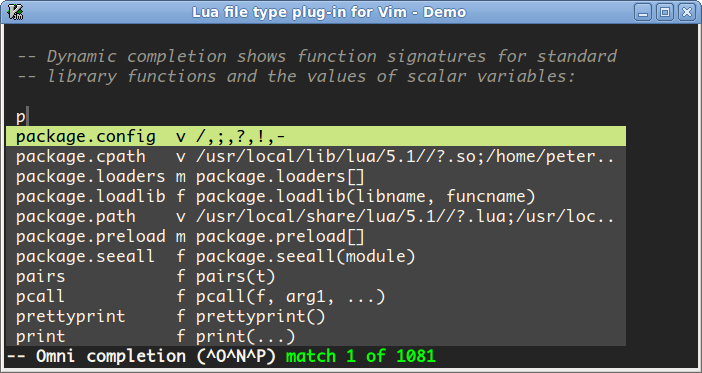The Lua file type plug-in for Vim makes it easier to work with Lua source code in Vim by providing the following features:
-
The 'includeexpr' option is set so that the gf (go to file) mapping knows how to resolve Lua module names using package.path
-
The 'include' option is set so that Vim follows dofile(), loadfile() and require() calls when looking for identifiers in included files (this works together with the 'includeexpr' option)
-
An automatic command is installed that runs
luac -pwhen you save your Lua scripts. Ifluacreports any errors they are shown in the quick-fix list and Vim jumps to the line of the first error. Ifluac -pdoesn't report any errors a check for undefined global variables is performed by parsing the output ofluac -p -l -
<F1>on a Lua function or 'method' call will try to open the relevant documentation in the Lua Reference for Vim -
The 'completefunc' option is set to allow completion of Lua 5.1 keywords, global variables and library members using Control-X Control-U
-
The 'omnifunc' option is set to allow dynamic completion of the variables defined in all modules installed on the system using Control-X Control-O, however it needs to be explicitly enabled by setting the
lua_complete_omnioption because this functionality may have undesired side effects! When you invoke omni completion after typingrequire 'orrequire('you get completion of module names
-
Several text-objects are defined so you can jump between blocks and functions
-
A pretty nifty hack of the matchit plug-in is included: When the cursor is on a
functionorreturnkeyword the%mapping cycles between the relevant keywords (function,return,end), this also works for branching statements (if,elseif,else,end) and looping statements (for,while,repeat,until,end)
Unzip the most recent ZIP archive file inside your Vim profile directory (usually this is ~/.vim on UNIX and %USERPROFILE%\vimfiles on Windows), restart Vim and execute the command :helptags ~/.vim/doc (use :helptags ~\vimfiles\doc instead on Windows). Now try it out: Edit a Lua script and try any of the features documented above.
Note that on Windows a command prompt window pops up whenever Lua is run as an external process. If this bothers you then you can install my shell.vim plug-in which includes a DLL that works around this issue. Once you've installed both plug-ins it should work out of the box!
The Lua file type plug-in handles options as follows: First it looks at buffer local variables, then it looks at global variables and if neither exists a default is chosen. This means you can change how the plug-in works for individual buffers. For example to change the location of the Lua compiler used to check the syntax:
" This sets the default value for all buffers.
:let g:lua_compiler_name = '/usr/local/bin/luac'
" This is how you change the value for one buffer.
:let b:lua_compiler_name = '/usr/local/bin/lualint'
This option contains the value of package.path as a string. You shouldn't need to change this because the plug-in is aware of $LUA_PATH and if that isn't set the plug-in will run a Lua interpreter to get the value of package.path.
When you write a Lua script to disk the plug-in automatically runs the Lua compiler to check for syntax errors. To disable this behavior you can set this option to false (0):
let g:lua_check_syntax = 0
You can manually check the syntax using the :CheckSyntax command.
When you write a Lua script to disk the plug-in automatically runs the Lua compiler to check for undefined global variables. To disable this behavior you can set this option to false (0):
let g:lua_check_globals = 0
You can manually check the globals using the :CheckGlobals command.
The name or path of the Lua compiler used to check for syntax errors (defaults to luac). You can set this option to run the Lua compiler from a non-standard location or to run a dedicated syntax checker like lualint.
The argument(s) required by the compiler or syntax checker (defaults to -p).
If you use a dedicated syntax checker you may need to change this option to reflect the format of the messages printed by the syntax checker.
To disable completion of keywords you can set this option to false (0).
To disable completion of global functions you can set this option to false (0).
To disable completion of library functions you can set this option to false (0).
When you type a dot after a word the Lua file type plug-in will automatically start completion. To disable this behavior you can set this option to false (0).
This option is disabled by default for two reasons:
- The omni completion support works by enumerating and loading all installed modules. If module loading has side effects this can have unintended consequences!
- Because all modules installed on the system are loaded, collecting the completion candidates can be slow. After the first run the completion candidates are cached so this will only bother you once (until you restart Vim).
If you want to use the omni completion despite the warnings above, execute the following command:
:let g:lua_complete_omni = 1
Now when you type Control-X Control-O Vim will hang for a moment, after which you should be presented with an enormous list of completion candidates :-)
If you have questions, bug reports, suggestions, etc. the author can be contacted at peter@peterodding.com. The latest version is available at http://peterodding.com/code/vim/lua-ftplugin and http://github.com/xolox/vim-lua-ftplugin. If you like this plug-in please vote for it on Vim Online.
This software is licensed under the MIT license.
© 2011 Peter Odding <peter@peterodding.com>.
